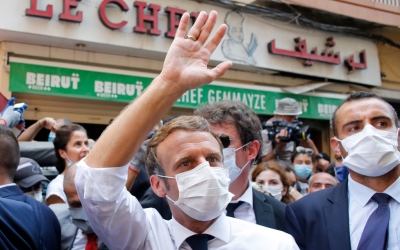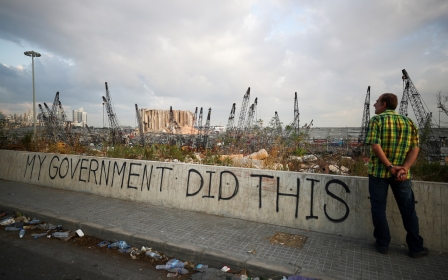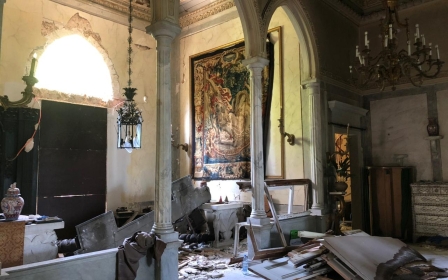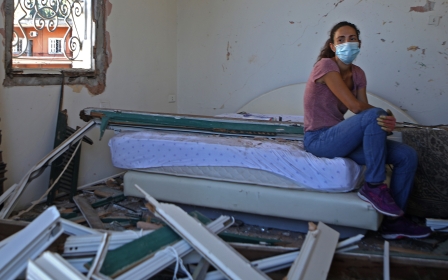Who is Mustapha Adib, Lebanon's new prime minister?
Crisis-hit Lebanon’s ruling parties appointed a new prime minister for the second time in eight months on Monday, following ex-premier Hassan Diab's resignation less than a week after the devastating blast in Beirut.
Though familiar faces at the Grand Serail - like Saad Hariri and Tammam Salam - were initial contenders, the name of Lebanon's ambassador to Germany, Mustapha Adib, cropped up for the first time less than 24 hours before his appointment. That same evening, he headed to Beirut from the German capital.
New MEE newsletter: Jerusalem Dispatch
Sign up to get the latest insights and analysis on Israel-Palestine, alongside Turkey Unpacked and other MEE newsletters
Of the 120 MPs who consulted with President Michel Aoun for a new prime minister, Adib received 90 of the votes. The runner-up was International Court of Justice (ICJ) judge Nawaf Salam, with just 15 votes.
Apart from the Christian Lebanese Forces (LF) party, now prime minister-elect Adib was endorsed by other key Lebanese parties, including both the Shia Hezbollah movement and the Sunni Future Movement.
"There is no time for talk, promises or wishes," the 48-year-old from Tripoli said during his first speech in the Baabda Presidential Palace, after being appointed on Monday. "It's time to work with full strength, with everyone's cooperation, to heal our nation and to restore people's hope in a better tomorrow."
While the rhetoric is common in cash-strapped Lebanon, the man at the podium wasn't. In fact, prior to Sunday, most Lebanese citizens had probably not heard of him.
From Beirut to Berlin and back
The new prime minister is no stranger to the Lebanese government and its political elite, but always remained low-key and has never taken on such a high role before.
'There is no time for talk, promises or wishes'
- Mustapha Adib, new Lebanese PM
Although former PM Saad Hariri proposed his name, Adib is close to another ex-premier, multibillionaire Najib Mikati, having been his adviser in various capacities over the past 20 years.
Though he is officially independent, Adib heads Mikati's Azm Cultural Centre and is on the board of his philanthropic organisation. Mikati appointed Adib chief of cabinet in 2011 when he was prime minister.
Adib holds a PhD in political science and law from France. Over the past seven years, the new premier was based in Berlin, Germany, where he served as Lebanon's ambassador.
A daunting task ahead
Outgoing prime minister Hassan Diab had been appointed in December with the Lebanese economy on its last legs.
Unlike his predecessor, who had been tasked with pulling Lebanon from the mire, Adib is now charged with pulling Lebanon out of the abyss, as the country's already ailing socioeconomic wellbeing continues to worsen amid the coronavirus pandemic and almost a month after the Beirut port explosion.
A recent harrowing report from the United Nations revealed that over half of Lebanon now lives in poverty - including 23 percent in extreme poverty - while 10 percent of the population owns over 70 percent of the country's wealth.
Two months of stagnant negotiations with the International Monetary Fund (IMF) for an economic bailout froze as political leaders, the banks and Diab's government could not agree on unified data and a pathway forward, followed by resignations from the negotiating team.
The Beirut blast has also left almost 200 people dead, over 6,000 wounded and hundreds of thousands homeless - with the physical damage alone estimated to cost up to $4.6bn.
The premier has an arduous task ahead trying to win back the confidence of an enraged population and the international community. And it's questionable which of these will be harder for Adib to appease.
UN Special Coordinator for Lebanon Jan Kubis was quick to celebrate Adib's appointment, immediately calling for the formation of a "credible and effective government … to quickly implement reforms" and to win back the confidence of the Lebanese people and the world at large. But the UN diplomat also warned that any failure to implement meaningful change would cause a "deepening of the collapse and misery, that the people will not accept anymore".
Race against the clock
After his press conference on Monday, Adib went to inspect the damage to buildings in Beirut's hard-hit Gemmayze and Mar Mikhael neighbourhoods. He spoke to aid workers and families impacted by the blast in his calm demeanour, but was also met with angry residents and protesters.
When asked by a protester if his government would exclude discredited political figures, he replied "God willing", as his security personnel ushered him away. He tried to assure others that he was not a representative of the ruling class.
"God willing, we will agree to have a ministerial team of competent specialists and hit the ground running," Adib said in the Baabda Palace, "to implement essential reforms swiftly, to put the country on the road to recovery."
Adib, like Diab before him, promised to form a government of experts, appointed based on their skill sets.
But forming a cabinet in Lebanon can be a complicated task, as political leaders tend to bicker over their representation based on political prominence and sect.
The task can be time-consuming - and paralysing. Diab's government took three months to form, but time is of the essence for Lebanon's ruling class and Adib.
On top of all this, it is unlikely that the new government, regardless of its makeup, will be able to work independently without intervention from the country's ruling parties and banking lobbyists. Diab's government often lamented interference in what it said were valiant efforts to bring about structural reforms.
French President Emmanuel Macron touched down in Beirut several hours after Adib had been appointed.
A one-on-one meeting with the new premier isn't on the itinerary, but Adib's low-key background and appointment by near consensus by the political elite is something most of the international community - including Macron - will be reassured by.
It remains to be seen, however, whether Adib will convince the people of Lebanon.
Middle East Eye delivers independent and unrivalled coverage and analysis of the Middle East, North Africa and beyond. To learn more about republishing this content and the associated fees, please fill out this form. More about MEE can be found here.







